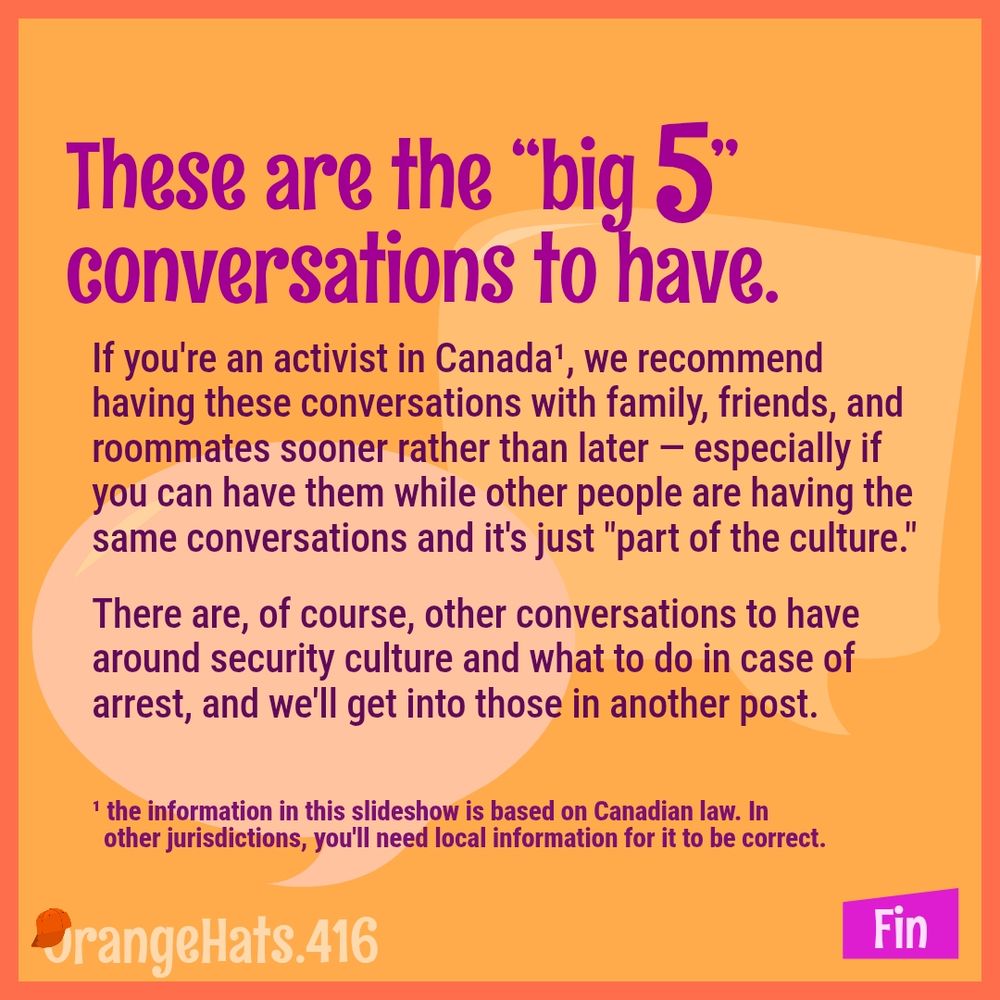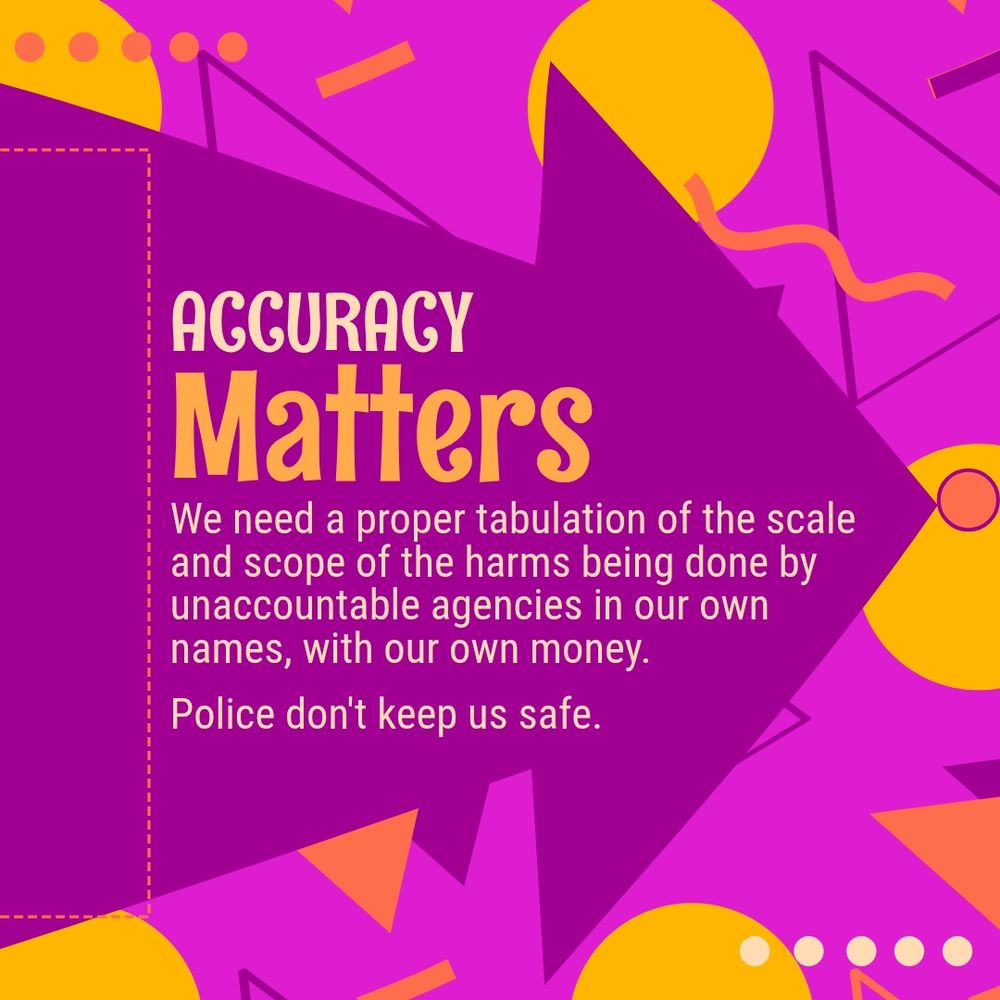“You know, it could be easy to say, oh, well, the law's not gonna save us. Yeah, no shit. We’re aware of the shortcomings of the law, but at the same time, you still gotta put up a fight. Like if you get snatched by the state you’re gonna wanna put up a fight. So…” 1/2
25.06.2025 18:35 — 👍 3 🔁 4 💬 1 📌 0

4. If the cops phone:
If at all possible, DON'T ANSWER THE PHONE and let the police leave a message.
If they (roommates, family) answer the phone, make sure they know to ANSWER NO QUESTIONS .
A simple, "I'm sorry. I am not interested," will suffice.
It is not illegal to hang up on the cops, but DO NOT LIE to them -that IS illegal.

5. DO NOT let the cops into the house
If they say they're looking for a particular person, and they don't have a warrant¹, don't open the door.
That means: NOT EVEN A CRACK or they may lie and say they saw something of imminent threat.
You DO NOT have to answer the door "for a chat".
If they say they HAVE a warrant, ask them to show it to you either slide it under the door, put it in the mail slot, or hold it up to the peep hole so you can read it.
If police have a valid warrant (see next slide), they are allowed to break into your house to get in.
¹either a search warrant or a Feeney/"dwelling house" warrant for arrest.

5b. How do I know if a warrant is valid?
A valid warrant should have:
• your name (if it is an arrest warrant),
• the criminal offence,
• your address
• the date(s) and time(s) the police are allowed to enter that address,
AND it should be signed by a Justice of the Peace or Judge.
If it says "dwelling-house," that means that the warrant deals with your house/apartment/etc.
If it says "arrest warrant" and your name, it is probably a warrant for your arrest.
If it says "search warrant," it's a search warrant, and it should have the location and types of things they're looking for.

These are the "big 5" conversations to have.
If you're an activist in Canada¹, we recommend having these conversations with family, friends, and roommates sooner rather than later — especially if you can have them while other people are having the same conversations and it's just "part of the culture."
There are, of course, other conversations to have around security culture and what to do in case of arrest, and we'l get into those in another post.
¹ the information in this slideshow is based on Canadian law. In other jurisdictions, you'll need local information for it to be correct.
@OrangeHats.416
Fin
2/2
The adage "a stitch in time saves nine," may feel outdated, but trust us, a conversation in time can save many: with cops and judges.
08.06.2025 23:40 — 👍 1 🔁 0 💬 0 📌 0

It's not enough to know your rights as long as the people around you don't know theirs. Five conversations activists should have with friends, roommates, and family.

You need to make sure friends, roommates, and family understand a few key things:
1. "DO not talk to the Cops" means DO NOT TALK to the cops.
It does not mean, "make small talk." It does not mean, "chat about a completely unrelated topic."
No one is helping by "explaining" the situation. All they will do is confirm or give new information. Police are trained in Relational Conversation to make people feel like they are on your side and that you can confide in them. Don't even let them practice.
The best course of action is always to extricate yourself from any interaction with cops as soon as possible.

2. Cops CAN and WILL lie to you.
In many places around the world, the police cannot lie to the public.
Canada is not one of them.
YOU cannot lie to Cops. That is illegal.
Cops, on the other hand, are not only totally free to lie to you, they are rewarded for it.
Legally speaking, the only people cops are not supposed to lie to are judges. Ask Umar Zameer how that works out in reality.
Make sure that roommates, friends and family understand this clearly.

3. We don't talk to cops. but ESPECIALLY not about ME.
Relatives, and older relatives in particular, have likely been taught to defer to authority figures.
But grandma doesn't need to tell Officer SeemsNiceEnough your whole life story.
This conversation is best had long before any issues arise, when you can honestly say you're having this chat as part of best practices.
Get in front of potential issues with friends, roommates, and family saying or doing the wrong thing when it comes to dealing with the cops.
Make time to have a few key conversations with key people.
#Toronto #TorontoActions #TorontoActivists
08.06.2025 23:34 — 👍 3 🔁 7 💬 1 📌 1

Police violence is ALWAYS the fault of the police.
They rely on shame and fear to keep you silent.
Tell us what happened.
5/5
Talking about cop violence demystifies it and puts the blame where it belongs: on the cops.
Help us enumerate the harms done in the name of society and with our own money.
#Toronto
02.06.2025 05:07 — 👍 3 🔁 0 💬 0 📌 0

Accuracy matters.
We need a proper accounting of the scale and scope of the harms being done by unaccountable agencies paid with our tax dollars.
Police don't keep us safe.
4/5
02.06.2025 05:07 — 👍 2 🔁 0 💬 1 📌 0

It's anonymized
As always, we're tracking the behaviour of the police, not protestors.
The information we log is anonymized and will only be shared in aggregate form.
DM us for our Signal ID.
3/5
02.06.2025 05:07 — 👍 2 🔁 0 💬 1 📌 0

WHY TELL US?
Our 2024 stats on police violence at protests have been quoted and referenced in multiple contexts, most recently in discussions around the bubble zone by-law.
It's important to counter the police narrative, which is self-serving and meant solely to increase their budget.
2/5
Please check in on comrades who have been assaulted by the cops. They're likely experiencing shame and self-doubt, which takes a toll on people's mental and physical health.
We only have each other.
02.06.2025 05:07 — 👍 2 🔁 0 💬 1 📌 0

HAVE YOU BEEN INJURED BY TPS AT A 2025 PROTEST?
We're tracking and reporting on the injuries cops cause protestors.
1/5
Police brutality is designed to make people feel alone and afraid to show up to fight systems of oppression.
We're especially seeking reports from the police violence that took place at Casa Loma on May 27, 2025.
#PoliceDontKeepUsSafe #Toronto #TorontoActions #TorontoActivists
02.06.2025 03:19 — 👍 2 🔁 1 💬 1 📌 0

In 2008. common Front Legal Collective joined with the Law Union of Ontario and became the Movement Defence Committee (MDC) MDC differed fundamentally from the NLG in considering members to be part of the movement rather than separate from it. It was a valued resource in the GTHA activist world. Highlights included:
Mass-training Legal Observers (LOs) for the Toronto G20 (a period legendary for police overreach and abuse);
Providing legal support to a wide range of progressive actions, such as: encampment defence, railway blockades, and antifascist counter-protests;
Training tens of thousands of people on Know Your Rights, Legal Observer (and other sessions) Lawyers and LOs supported thousands of protests (averaging 100+ protests each year).

At the start of 2025. MDC became two groups. each with a specific mandate:
Movement Legal Defence Committee:
Lawyers and law students doing lawyer-y things.
Orange Hats
Legal observers doing and teaching copwatch. Mainly.

MAINLY?
Yes: Mainly.
Evolving into Orange Hats gives us the freedom to carry out additional activities without impacting the legal team.
And at the top of the list of things we can do now is: talk about what we observe. And since we're there to watch the cops. we're talking about what they're up to.

We've observed so much bad behaviour from the police over the years. Last year, the police brutality and malfeasance happened non-stop, with zero accountability.
But you know what they say:
Sunshine is the best disinfectant.
2/3
At the start of the year, MDC became two groups, with complementary but distinct mandates.
The separation gives us the freedom to do more, without impacting the legal process. For far too long we have held our tongues about what we were seeing from the police at protests and at encampments.
21.05.2025 02:37 — 👍 1 🔁 0 💬 0 📌 0

Orange Hats Legal Observers:
Who we are, and how we got here.
Watching the cops.

Civilian Copwateh started in the 1960s with Black Panther Patrols
These were made up of individuals on foot or in vehicles, armed, with legal books, paper, and pens.
They followed police to stops in order to document their behaviour.
They assisted community members during police interactions, providing legal information about rights; and
Their presence helped minimize police overreach and brutality.

The Black Panther model was adopted by communities all around the world. Examples include:
Pig Patrol, Australia
The Polynesian Panthers
Central Citizens Defence Committee (CCDC), lreland.

In 1968, the National Lawyers Guild (NLG) formalized the practice. and "copwatch" became "Legal Observers".
Legal Observers (LOs) were developed in response to Columbia University protests.
All green hat LOs in the US have taken the NLG training.
The NLG establishes Lawyers attorney-client privilege with the orgs they work with.
Maintains a policy of separation between observers and activists.
Yes, they have a registered trademark on the phrase in the US.
Orange Hats was the legal observer arm of the former Movement Defence Committee.
First a little history:
Did you know civilian legal observing/CopWatch started with the Black Panthers in the 1960s?
Read on.
#LegalObservers
21.05.2025 02:25 — 👍 1 🔁 0 💬 1 📌 0

Slideshow title card for
Collective Defence:
You don't have to go It alone

If you are arrested at a protest where multiple arrests take place, consider Collective defence.
Collective Defence is a legal approach where multiple people face in charge of stemming from an event choose to create a defence strategy together.

The state criminalizes protesters to undermine movements and crush collective action.
It does this by reducing a unified group to individual protestors, who can be isolated, injured, and arrested, which instills fears in others.
Collective Defence rejects that isolation and fear.

Collective Defence is both a politic and a legal strategy. Key political principles include:
1. Non-cooperation with police and Crown;
2. Seeking global outcomes and sharing resources/information;
3. Understanding that defendants may have different goals and needs;
4. Collective decision making around legal process;
5. Remembering that the individuals involved are part of the broader political context.
Speak to a movement lawyer for more information.
What is Collective Defence and how can combining your legal strategies with other activists arrested during the same action help you get better outcomes from the legal system?
Info from the Community Justice Collective.
orangehats.noblogs.org/policing/wha...
#LegalSupport #ActivistResouces
30.03.2025 03:29 — 👍 1 🔁 0 💬 0 📌 0
























